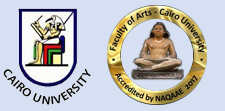عنوان المقال عربي
تأثير المجازات الإدراكية في تكوين الحقول الدلالية حقل الغضب في "المخصص" لابن سيده نموذجا
Document Type
Original Study
Subject Area
Language and Literature
Keywords English
Cognitive Metaphors، Semantic fields، Anger، Ibn Sidah
كلمات مفتاحية عربي
المجازات الإدراكية، الحقول الدلالية، الغضب، ابن سيده
Abstract English
The current research is designed to recognize the effect of cognitive metaphor and metonymy on the formation of semantic field in the language. It adopts the Anger field in "Al-Mukhassas" by Ibn Sidah, as an applicable model. The research started from the data of cognitive linguistics, which is concerned with studying the effect of metaphor on human thinking and cognitive. In this direction, metaphor is no longer a matter of transferring a word from a real meaning to another metaphorical meaning, but rather it is one of the means of cognition that people possess and employ in understanding their internal experiences. Through the physical sensory experiences they interact with through their bodies. The research concludes that metaphor and metonymy had an effect on the formation of the Anger field in "Al-Mukhassas". This is illustrated by the cognition of anger through metaphor, projecting sensory experiences onto it. Moreover, anger is understood through metonymy, focusing on the signs and marks that appear on the body of an angry person. Since this perception occurs at the level of the mind, it is reflected in the language used when expressing anger. The words and expressions included in the Anger field are usually the result of cognitive metaphor or cognitive metonymy.
الملخص العربي
الملخص:حاول هذا البحث الكشف عن تأثير الاستعارة والكناية الإدراكيتين في تكوين الحقل الدلالي في اللغة، وقد اتخذ من حقل الغضب في المخصص لابن سيده نموذجًا تطبيقيًّا. وانطلق البحث من معطيات اللسانيات الإدراكية التي تعنى بدراسة تأثير المجاز في التفكير والإدراك الإنساني، ففي هذا الاتجاه، لم يعد المجاز من باب نقل الكلمة من معنى حقيقي إلى معنى آخر مجازي، وإنما هو وسيلة من وسائل الإدراك التي يمتلكها الناس، ويوظفونها في إدراك تجاربهم الداخلية عبر التجارب الحسية الفيزائية التي يتفاعلون معها عبر أجسادهم. وقد احتلت الاستعارة والكناية الإدراكيتان في هذا الاتجاه اللساني أهمية خاصة، نظرا لما لهما من تأثير في الفهم والإدراك. وخلُص البحث إلى أن للاستعارة والكناية تأثيرًا في تكوين حقل الغصب في المخصص، وتمثل ذلك في أن الغضب مدرَك عبر الاستعارة من خلال إسقاط تجارب حسية عليه، وعبر الكناية من خلال الإشارات والعلامات التي تظهر على جسد الشخص الغاضب. ولما كان هذا الإدراك على مستوى الذهن، انعكس ذلك في اللغة المستخدمة في الحديث عن الغضب، فما في حقل الغضب من كلمات وتعبيرات هي في الغالب آتية نتيجة لاستعارة إدراكية، أو كناية إدراكية.
Recommended Citation
Al Huwaity, Talal Mouflih
(2024)
"The Effect of Cognitive Metaphor on the Formation of Semantic Fields
The Anger Field in "Al-Mukhassas" by Ibn Sidah, as a Model,"
Journal of the Faculty of Arts (JFA): Vol. 84:
Iss.
2, Article 2.
DOI: https://doi.org/10.21608/jarts.2024.268907.1441
Digital Object Identifier (DOI)
10.21608/jarts.2024.268907.1441
Accept Date
2024-03-07
Publication Date
4-1-2024

